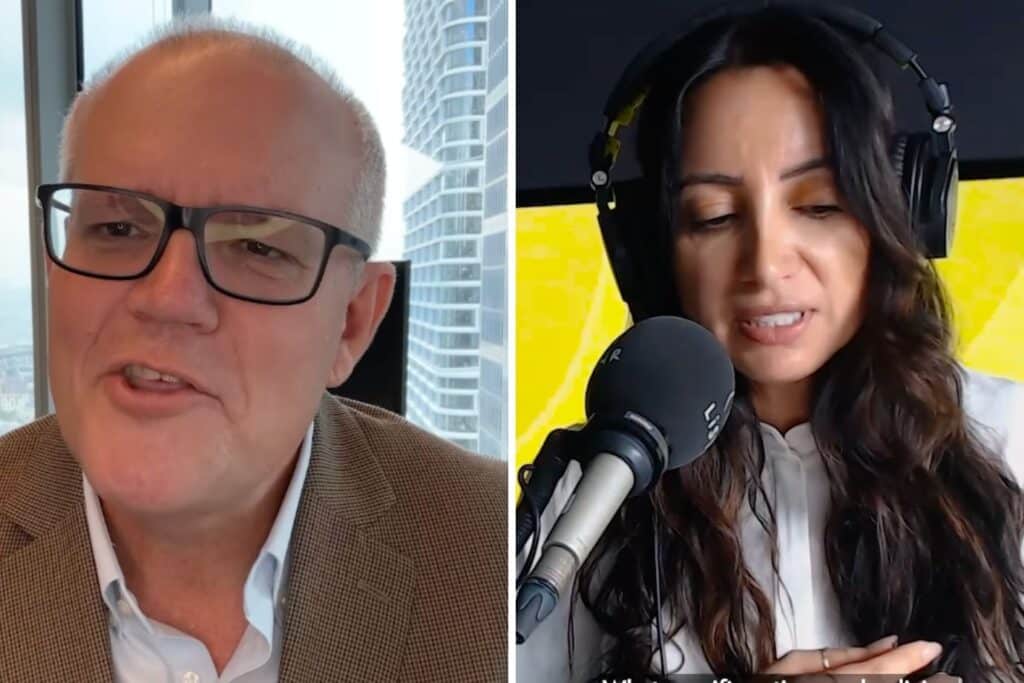Scott Morrison believes he did everything he could to address domestic, family and sexual violence during his time as the 30th Prime Minister of Australia.
In what was a rather “awkward” interview with Antoinette Lattouf on LiSTNR’s podcast The Briefing, the former prime minister said he was “disappointed” that the crisis of male violence against women was “weaponised for political purposes” during his time in office.
When asked if he regretted his decision not to attend the Women’s March for Justice rally in 2021, he said he dealt with the issue in “good faith”.
“I was the subject of what was a rather vicious campaign,” Morrison said.
“There was a lot of politics around that. I dealt with that issue in absolutely good faith, and when it comes to our policy commitments, we had the record of investment in these issues, and sought to do so in a bipartisan way, and not weaponise those issues or politicise those issues.”
Morrison noted that when he was treasurer, the Coalition government invested up to $200 million into the National Plan to End Violence Against Women and Children, then “billions” of dollars in his government’s final budget.
“I did everything I believe I possibly could have, and that’s my honest answer,” Morrison said.
“When I say (violence against women) shouldn’t be politicised, it’s certainly a matter of politics, there’s no doubt about that. But I was disappointed that the issue was weaponised for partisan purposes and weaponised for political purposes.”
Morrison appeared on Saturday’s edition of The Briefing podcast to discuss his recent book Plans For Your Good: A Prime Minister’s Testimony of God’s Faithfulness. He stressed that the book is not a political memoir, but rather one of “pastoral encouragement”.
“I had no interest in writing a political memoir,” Morrison said.
“I didn’t waste a day when I was in office, and I don’t really feel the need to go around protesting or defending it. What I felt the need to do is give acknowledgement to what God has done in my life and the impact he has had on me and encourage others to think about faith.”
Antoinette Lattouf, the host of the podcast, asked Scott Morrison about certain “omissions” in the book, including his role in Operation Sovereign Borders, the Robotdebt scandal and the secret ministries he appointed himself to during the COVID-19 pandemic.
“I’ve addressed all of those issues in other forums, and at some length, and they’re issues that the media have spent a lot of time on,” Morrison responded.
“This is not a political treatise, it’s not about providing either a defence or a promotion of my time in government. It’s not about what I did, it’s about what I believe God has done for me.”
Lattouf asked Morrison if he has “repented” or “sought forgiveness” for any policies or choices from his time in power.
“They’re things between me and God,” he responded.
‘Cancelled for my faith’
Scott Morrison has been open about his faith and connection to the Pentecostal Christian church. During his interview on The Briefing, he suggested he was “cancelled” because of his faith.
“If you don’t think cancel culture applies when it comes to people of Christian faiths in this country, then look a lot closer,” Morrison said.
Morrison said there is a “form of tyranny” emerging in secularism, involving the “cancelling of Christians” led by those “seeking to dismiss” people of Christian faiths in Australia. He said “to a large extent” he was a victim of “cancel culture” targeted at Christians. Morrison said he was “regularly mocked” for his Christianity, including a time he attended his Pentecostal church on Easter Sunday.
Much of the criticism surrounding Morrison’s book points to the evangelical nature of his writing. Many critics have suggested the book is targeted at audiences overseas, especially Christian readers in the United States.
When Lattouf suggested his book was a “long CV” written to “score the next gig” in the US, Morrison said that view was rather “cynical”.
According to reports, Morrison is now working for American Global Strategies (AGS), a consulting firm in the US known for its work in the defence sector. The organisation was founded by Robert O’Brien, who was previously an advisor to the former president of the US, Donald Trump.


